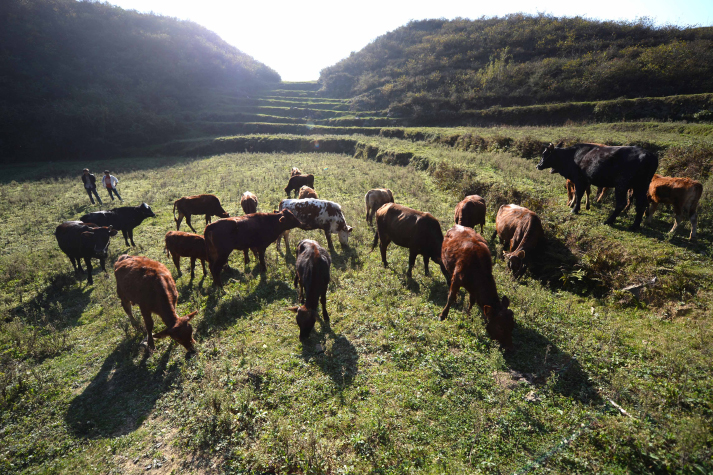|
||||||||||
| Home Nation World Business Opinion Lifestyle ChinAfrica Multimedia Columnists Documents Special Reports |
|
||||||||||
| Home Nation World Business Opinion Lifestyle ChinAfrica Multimedia Columnists Documents Special Reports |
| ChinAfrica |
| Poor No More |
| Joint efforts help China in its final battle against poverty |
| By Hu Fan | VOL.11 January ·2019-01-03 |

Eight in the morning is breakfast time at the care center in Lichang Village, Zuoquan County in north China's Shanxi Province. Established in 2014, the care center provides three meals a day free of charge for some 40 villagers aged above 65.
Wang Peng, 30, has been eating there for more than half a year. His work is to learn more about the needs of these senior villagers. He is an employee of the China International Publishing Group (CIPG) based in Beijing, and was sent to the village in June 2018 on a mission to support the local poverty alleviation work. Zuoquan County is a state-level impoverished county and was included in a partnership with CIPG in 2002. Since then, CIPG has sent some 30 staff members there on 11 missions, as part of its support for poverty alleviation.
"The care center canteen is open all year round and the menu is different for each day of the week, so that the elderly can enjoy their meals and their children working far from home don't have to worry about them," Wang told ChinAfrica.
Targeted help
Lichang Village, to which Wang is assigned, is 1,350 meters above sea level. There, the days are short in winter and long in summer, and crops yield only once a year. The village has a population of 386 in 146 households, of whom less than 200 are permanent residents, mostly elderly people.
Its harsh natural conditions and the absence of most of its young adults resulted in the village descending into poverty. Sixty-three households, comprising 181 villagers, have a per-capita annual income of less than 2,800 yuan ($407), China's national poverty line. The village used to have no income apart from receiving compensation for returning farmland to forests, a state-funded environment policy.
Now it has a duck farm. Part of Wang's daily routine is to check on the conditions of the ducks. The farm has three highly automated duck sheds, each accommodating about 30,000 ducks, and is the result of a joint program carried out by CIPG and the local authority. This is in line with the targeted approach to poverty alleviation, an idea first proposed in November 2013 by Chinese President Xi Jinping on a visit to Xiangxi, Hunan Province. It features precise identification of the poor population and targeted measures specific to any region, village, or even individual in need of help.
Duck breeding was chosen for the village based on the fact that the cool climate there provides a comfortable environment for ducks, and that the geological position and traffic conditions allow quick transportation of ducks to the markets.
As a targeted approach to poverty alleviation for Lichang Village, the duck farm benefits the locals in different ways. It offers nine jobs for a yearly salary of about 40, 000 yuan ($5,816) each. Another 15 households that are incapable of working were invited to join the program as stakeholders with a 50,000 yuan ($7,270) loan from local banks.
The concept of a targeted approach to poverty alleviation was put forward in the context that after China had lifted over 740 million people out of poverty in the last 40 years, further reduction becomes more difficult as the poor population gets smaller.
"In the past, when a policy was introduced, it helped rid large groups of people of poverty. Now what remains is the most difficult part of the work," said Liu Yongfu, Director of the State Council Leading Group Office of Poverty Alleviation and Development. Today, with these targeted measures, poor households in China like the ones in Lichang Village are supported. The duck farm in Lichang Village generates an annual profit of more than 800,000 yuan ($116,000), of which 35 percent goes to the public account of the village. It provides financial support for those most in need. Wang said that the care center is one of the initiatives funded with this money.

A promise delivered
What CIPG's efforts represent is a nation-wide battle against poverty in tandem with many other organizations in China, be they central or local, state-owned or private.
On a wasteland in Bijie, southwest China's Guizhou Province, a poverty alleviation team of Evergrande, a Fortune Global 500 company based in south China's Guangdong Province, is building the company's 447th cattle breeding base in Guizhou, where a new batch of pure-species Angus cattle imported from Australia will be kept. For decades, Bijie has been one of the poorest mountain areas in west China. Considering its optimum temperature and rich pasture, Evergrande introduced the breeding of Angus cattle in the hope that this imported variety may generate extra profit for the locals by feeding China's increasing demand for high-quality beef.
Evergrande got involved in poverty alleviation initiatives in December 2015, when it volunteered to offer help to Dafang, one of Bijie's 10 counties, and donated 3 billion yuan ($436 million) for poverty alleviation. In May 2017, Evergrande expanded its help to the nine other counties and invested another 8 billion yuan ($1.16 billion).
In addition to financial support, Evergrande selected 321 cadres from the group to lead a team for poverty alleviation. Its ambition is to lift the 924,300 poor people of Bijie out of poverty by 2020.
This east-west poverty alleviation collaboration started in 1996, when a policy was formulated in the central government's conference on poverty alleviation and development to pair developed coastal areas in the east and poor areas in the west.
In 1988, to develop a country with a vast territory and great development gaps between the east and the west, the central government decided that priority should be given to the eastern coastal areas to allow them to develop first, after which they would help the western areas.
No one left behind
Dulong Township, southwest China's Yunnan Province, is where the Drung people have lived for generations. With a population of about 7,000, the Drung is one of China's smallest ethnic groups. As the township is located in a valley among steep mountains, traffic is the key to poverty alleviation there.
In 1996, the government built a road for the township, which was for some time the only passage connecting the township to the outside world. However, the road worked for only half of the year, while for the other half, heavy snow sealed the mountains, making access impossible. When the road was impassable, the transportation of goods depended on horses. Each year before the mountains were sealed, the government had to organize horse caravans to transport necessities to Dulong Township. Each trip took five to six days.
The problem was solved on April 10, 2014, when a 6.68-km tunnel through the mountains was completed. With a better road, came a better life. In 2017, the per-capita net income of Dulong Township reached 4,959 yuan ($722), more than four times that of 2009.
"On the march toward common prosperity, no one must be left behind." This is what President Xi said repeatedly to poverty alleviation workers. At the 2015 Global Poverty Reduction and Development Forum, he announced the target of eliminating poverty across China by the end of 2020. This means there is not much time left for poverty alleviation workers countrywise.
Wang is not too worried about the time factor because Zuoquan County has completed its poverty alleviation mission. In May 2019, the county will be assessed by the State Council Leading Group Office of Poverty Alleviation and Development. Wang is confident about the result, but he points out that this does not mean the end of their work.
"What we do next is to continue to develop our programs and consolidate the results of poverty alleviation," he said.
(Comments to hufan@chinafrica.cn)
| About Us | Contact Us | Advertise with Us | Subscribe |
| Copyright Beijing Review All rights reserved 京ICP备08005356号-5 京公网安备110102005860号 |